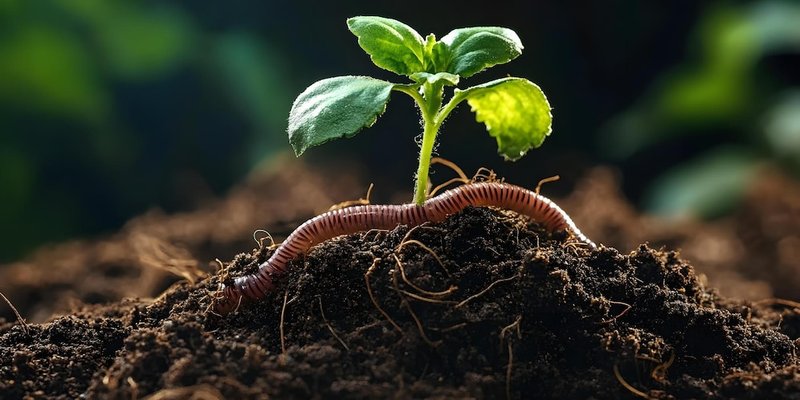
Imagine the soil as a bustling city, where the earthworms are the construction workers. They help build the infrastructure needed for plants to grow robustly. Without these little guys, our green friends might struggle to survive. Let’s dig a little deeper into how earthworms influence root development in plants and why their presence in the soil is so crucial.
What Are Earthworms and Why Are They Important?
Earthworms are fascinating creatures that live in the soil, and they come in various types, like the common red wiggler. These little invertebrates feed on organic matter, breaking it down into rich nutrients that plants need. Think of earthworms as nature’s recyclers, taking decaying leaves and other matter and turning them into valuable fertilizer. Because of this, they are vital to maintaining healthy ecosystems.
But their importance doesn’t stop at recycling. Earthworms also help improve soil structure. As they burrow through the earth, they create channels that allow air and water to flow more freely. This means that roots can access the moisture and nutrients they need without much hassle. Picture it like a series of highways running through a city, allowing traffic to flow smoothly. Without earthworms, the soil might become compacted and tough for roots to navigate.
How Earthworms Promote Root Growth
You might be wondering, “How exactly do earthworms help plants grow their roots?” Well, it’s all about their lifecycle and the way they interact with the soil ecosystem. When earthworms consume organic material, they produce **castings**—a fancy word for worm poop. These castings are packed with nutrients like nitrogen and phosphorus that plants crave. Think of them as the gourmet meals that help roots thrive and expand.
Moreover, studies show that when earthworms are present, plants often develop deeper and more extensive root systems. This is because the nutrients in worm castings are not only abundant but also in a form that plants can easily absorb. So, when you see a plant flourishing, there’s a good chance that earthworms are doing their part beneath the soil.
The Role of Soil Aeration in Root Development
Aeration is key for healthy plant roots, and earthworms are experts at this. When they burrow through the soil, they break up compacted dirt, increasing the pore spaces. This means that roots can access oxygen and water more effectively. You can think of it as creating a breathable atmosphere for roots to grow.
With better soil aeration, roots can stretch wider and deeper. They can explore new areas for nutrients and water, making the entire plant healthier. It’s much like how we feel better in well-ventilated rooms; plants need good airflow around their roots to thrive.
Earthworms and Soil Fertility
Aside from aeration, earthworms enrich soil fertility in several ways. The organic material they consume is transformed into nutrient-rich castings, as we mentioned earlier. These castings improve the soil’s nutrient content and its ability to hold moisture. This is particularly important in drier climates where plants struggle to get enough water.
Furthermore, earthworms also help with **microbial activity**. They introduce beneficial microbes into the soil, which assist in breaking down organic matter and releasing nutrients that plants can absorb. It’s like adding helpful team members to a project. With everyone collaborating, the outcome is far better.
The Impact of Earthworm Activity on Root Health
Earthworms play a significant role in maintaining the overall health of plant roots. Their constant movement within the soil helps to keep it loose and well-aerated, which prevents soil diseases from taking hold. If the soil is too compacted, it can lead to root rot and other issues that can harm plants.
Additionally, the interactions between earthworms and soil microbes create a balanced environment that promotes root health. Healthy roots mean healthier plants, which can better withstand pests and diseases. Just like how we take vitamins to stay strong, plants benefit from having a well-functioning underground ecosystem.
Creating a Habitable Environment for Earthworms
If you want to encourage earthworms in your garden, there are a few simple steps you can take. Here’s a quick list to get you started:
- Compost: Add organic compost to your soil. This provides earthworms with a food source.
- Avoid Chemicals: Limit the use of pesticides and synthetic fertilizers, as these can harm earthworm populations.
- Moisture: Keep the soil moist but not waterlogged. Earthworms thrive in damp environments.
- Mulching: Use mulch to create a protective layer, keeping the soil temperature stable and providing a habitat for worms.
By nurturing these little soil dwellers, you’re investing in the health of your plants. Healthy earthworm populations can lead to more vigorous root systems and, ultimately, better plants.
Earthworms might be small, but their impact on root development in plants is monumental. They help with nutrient recycling, improve soil aeration, and promote overall root health. So the next time you see a lush garden or a thriving houseplant, remember that there’s likely a busy little worm community working hard beneath the surface.
In short, earthworms are nature’s silent helpers, ensuring that plants have everything they need to grow strong and healthy. By cultivating a soil environment that supports these incredible creatures, we can enjoy the benefits of a flourishing ecosystem right in our backyards. So let’s raise a toast to the earthworm—nature’s unsung hero!
